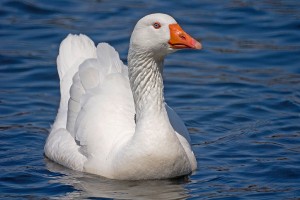 Apropos of our recent discussion of the ‘oo’ vowel in Multicultural London English:
Apropos of our recent discussion of the ‘oo’ vowel in Multicultural London English:
The ‘oo’ vowel in ‘goose’ is undergoing a fairly remarkable worldwide shift. When we transcribe this vowel in the International Phonetic Alphabet, we typically use the symbol /u/. This denotes a vowel with the tongue high and back, and the lips rounded. But in reality, few English accents still pronounce it this way.
There are some accents of English that still realize ‘oo’ as a fully back vowel: the accent of my home region of New England is one, as are accents of Upper Midwestern States like Minnesota and North Dakota, not to mention some Irish brogues (particularly in the west). And there are no doubt a smattering of accents in the United Kingdom that maintain a back ‘oo’ as well.
But these are in the minority. In most regions of the world, this vowel is fronting (moving forward in the mouth). And while vowel shifts aren’t puzzling in and of themselves, it’s perplexing why this is happening on such a large scale.
The most advanced GOOSE fronting is found, arguably, in Southeast England, the American South, and the commonwealths of the Southern Hemisphere (Australia, NZ, and South Africa). In these regions, ‘oo’ may shift as far forward as the ‘i’ in ‘kit’ (albeit with the lips rounded) and perhaps even further. In all of these cases, ‘oo’ is fronted along with the /o/ in words like ‘goat,’ ‘rode,’ and ‘go.’ The two vowels move hand in hand.
But to a subtler degree, ‘oo’ is fronting in all parts of the English-speaking world. It’s noted in California English, Canadian English, Dublin English, and even in types of English once thought resistant to ‘goose-fronting,’ such as African American Vernacular English.
So regardless of where and how this shift is found, it is occurring on a large scale. For example, one of the things I notice about older General American accents, when compared to accents typical of my generation, is that younger GenAm speakers front ‘oo’ a good deal more. I’m curious to see if this process continues: will ‘standard’ American speech eventually feature an ‘oo’ vowel as fronted as it is in London?
The bigger question, of course, is why this shift is occurring in so many parts of the English-speaking world in the first place. Why has this spread so far, so quickly?


“The most advanced GOOSE fronting is found, arguably, in Southeast England, the American South, and the commonwealths of the Southern Hemisphere…”
Don’t forget Scotland and Northern Ireland. We do often have a different system with FOOT and GOOSE merged though.
I do have a theory for why this shift is happening in so many different places. A fully back GOOSE is a characteristic of many foreign accents. Maybe people realize this at some level and use fronter realizations to distinguish themselves from “foreign” speakers of English.
The reason the GOOSE vowel is so front in Scotland is presumably to keep it separate from the [u:] still used by many Scots in MOUTH words.
@Craig,
That’s definitely true about Scotland. Actually, Glasgow is perhaps the most extreme, in that /u/ not only shifts all the way front, but actually starts to rotate counterclockwise: in the strongest of Glaswegian, ‘goose’ can be pronounced with a vowel quite close to the ‘e’ in ‘dress.’
@AW,
That’s possible, although I’d also note that /u/ fronting seems to be accompanied by something of a vowel shift in Edinburgh: GOAT actually moves toward the vowel space left empty by the shifting of GOOSE.
Can you share some examples of the back and front versions of oo sound like?
Sure! Check out this video of Limerick native/hurler Ciaran Carey, and note his pronunciation of ‘move’ at :48 —
http://www.youtube.com/watch?v=AngamT_ga5E
Then compare that to this interview of Alan Cumming, and note his pronunciation of ‘true’ around :47 —
http://www.youtube.com/watch?v=KNg8qN3gT3o
You’ll note that whereas the former uses a kind of ‘pure,’ back ‘oo’ sound, the latter uses a vowel that is surprisingly close to the vowel in ‘geese.’
My personal goose vowel is more like a diphthong, along the lines of /ɨw/, almost like “ew”
According to WALS languages with front rounded vowels tend to clump together and theorized this might because languages are more likely to develop these kind of vowels when in contact with another language with said vowels. In the case of English, most of western Europe, with French, Scandinavian, German, provided this influence. Maybe this tendency of contact borrowing explains the expansion of the feature throughout the English speaking world?
Are you from California?
Nope, Ah’m Oklahoman on more Oklahoman
I’ve heard that pronounciation is common amongst the south, though it is also found in California.
Oh okay. That’s another possibility. I wish I knew what my GOOSE was. It’s definitely not monophthongal, cardinal 8 [u], but I don’t think it’s [ɨw] either. I’ll just say it’s something in between [ɯ̟w].
I think some of the features of California English, such as /u/-fronting, are spreading throughout the western US. I hear it pretty frequently in Utah and from people from neighboring states, though it’s maybe not as pronounced as it is in some other regions.
I have a fairly neutral regional Irish accent and use the fully back ‘oo’ vowel like most of the country. Fashionable Dublin English vowels sound completely alien to my ears, although most young TV presenters now speak this way. Here’s an example with Glenda Gilson, who typifies this type of speech. The contrast with the Cork man she’s interviewing is interesting. Both say the word ‘food’, at :30 and 1:04 respectively, but Glenda’s pronunciation of ‘loose’ at :52 really demonstrates the way this vowel is going in the posher Dublin accents (it sounds almost like ‘lease’ to me).